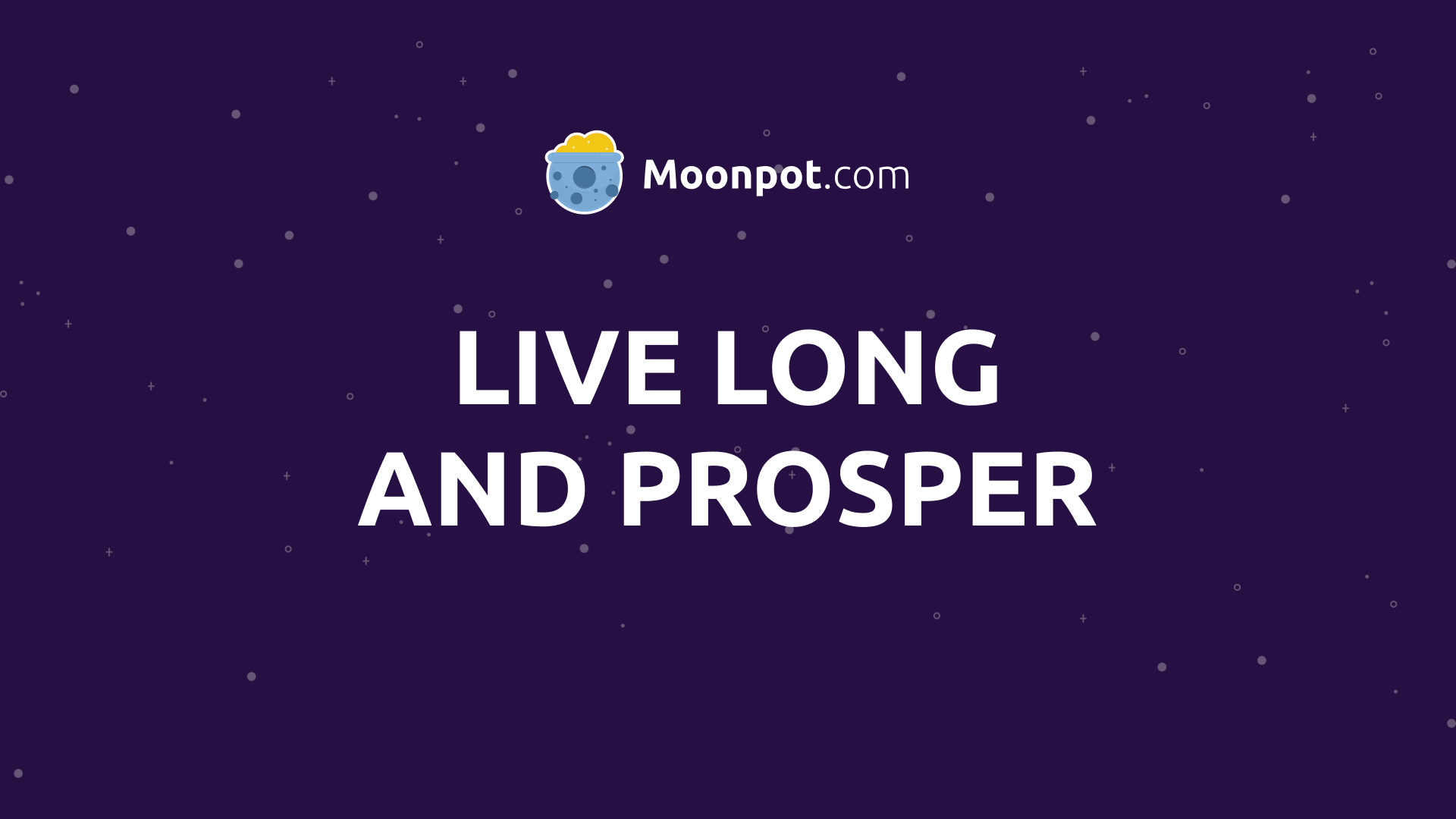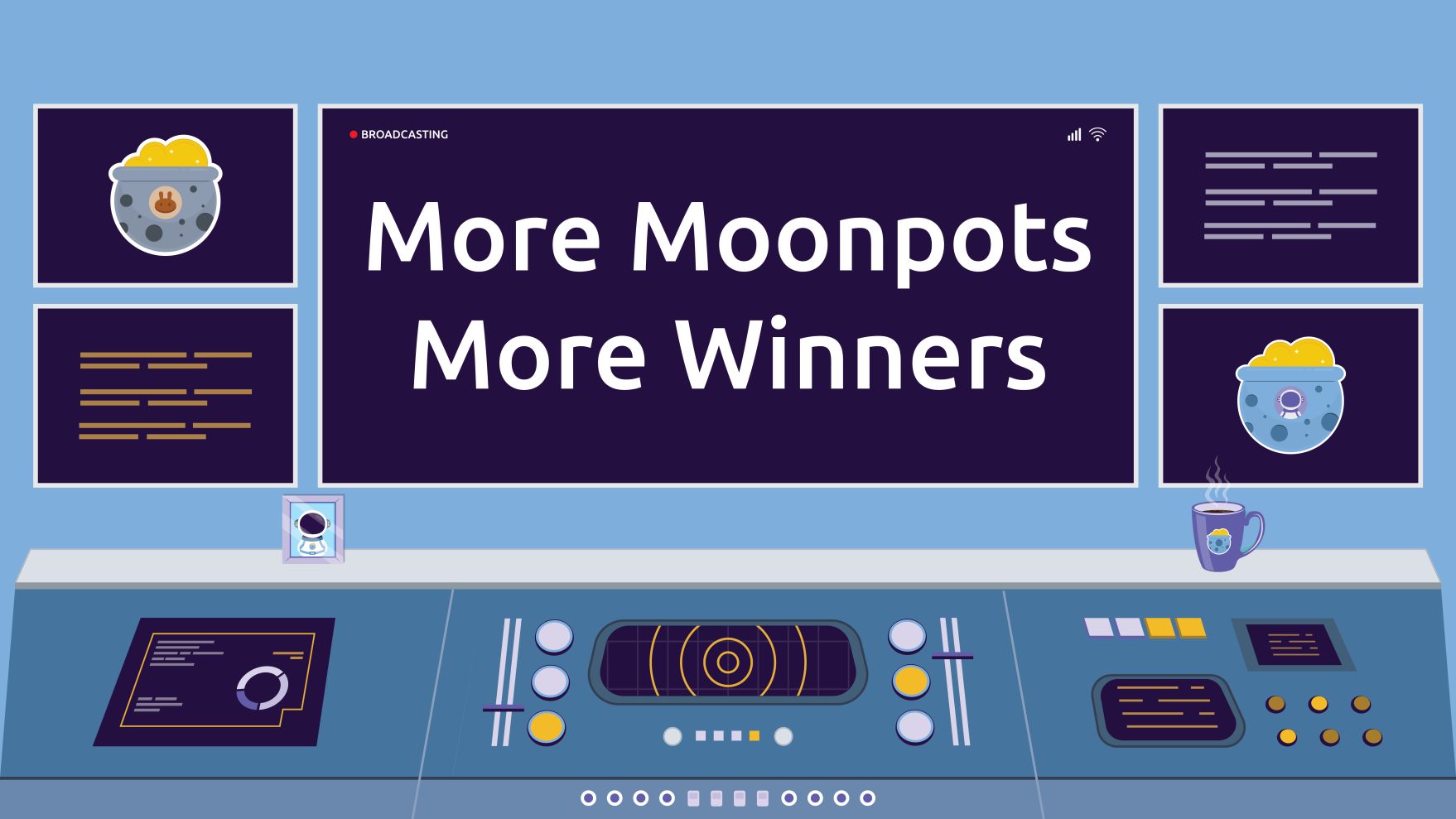
Welcome back to Moon Academy where each week we walk you through the answers to your most frequently asked questions. This time around we’re tackling the topic of winning tickets.
Did you know that multiple winning tickets can come from the same wallet in one prize draw?
We explain how and why this is the case, why it’s inherently fair, and why it would be bad any other way. Class is now in session.
Can one wallet win more than once in the same prize draw?
In a word: yes.
The important thing to realize here is that prizes are awarded to winning tickets NOT to wallets.
Remember, you are given 1 MoonTicket for every 2 tokens of an asset you deposit on Moonpot. And so anyone who holds multiple tickets can win multiple times. Because that is the nature of randomness and fairness. How so?
Let’s break it down with a very simple metaphor:
Imagine that all the MoonTickets issued for deposits into a particular Moonpot are put together in a big bag. One ticket is pulled out at random. That ticket wins a prize. The next ticket is pulled out at random. That ticket then wins a prize too.
This is repeated until all the winners have been randomly selected. So if the Pot has ten winning tickets, for example, then ten tickets are pulled out.
All of this means that if one wallet holds, say, 10,000 MoonTickets, then it’s not impossible for more than one of those tickets to be picked out at random as a winning ticket.
Note that it’s also possible for a wallet holding, say, just five tickets, to have all five picked out as winners. It’s just much more statistically unlikely.
Because: math.
As an aside for those of you holding less than one ticket, or a fraction of a ticket — like you have 0.33 or 4.27 tickets, or whatever — the prize-drawing system in our metaphor would also be able to pull out ticket pieces.
So remember: you don’t need a full ticket to win. It’s just that a third of a ticket is a third less likely to win than a full ticket, of course.
For the record, all the above is a metaphor to help you understand why one wallet can win more than once. There’s not a literal ticket-pulling mechanism or any glamorous assistants holding shiny balls in play here.

Why not limit it to one prize per wallet? Wouldn’t this make it fairer for everyone?
Stop for a moment to think about what you’re saying. It doesn’t make any sense.
Let’s say someone deposits 20,000 CAKE into our CAKE Moonpot. They now have 10,000 MoonTickets. The prize draw takes place and it just so happens that two of their tickets are picked as winners. This feels unfair to you.
Now think about that same individual with 20,000 CAKE, but split across two wallets. They then deposit into the CAKE Moonpot with both wallets. This means they end up with 5,000 MoonTickets in one wallet and 5,000 MoonTickets in the other.
They still have exactly the same statistical chance of winning as before because they hold 10,000 MoonTickets. It doesn’t matter if these tickets are in one wallet or two. Just in the same way that if you buy two tickets to a raffle it doesn’t matter if you put them together in one pocket or put one in your jacket and one in your bag — you still have the same statistical chance of winning prizes based on the number of tickets in your possession.
So, to recap: 5,000 MoonTickets in one wallet; 5,000 MoonTickets in the other. Now imagine that one winning ticket is from one wallet, and another winning ticket is from the second wallet.
On the list of winners, it looks like two different individuals have won. On some level, this seems fairer to you than one wallet winning. Two different winners, you think.
But it’s EXACTLY THE SAME. The prizes are awarded to winning tickets NOT wallets.
In the two examples above the outcome is exactly the same — it’s one individual winning two prizes in the same draw. It just looks different to you because you’re thinking about wallets.
Remember: it’s about winning tickets not winning wallets.
But why is it okay for one person to win twice in the same prize draw?
Well, this is literally how prize draws work.
If you go to a raffle with 10 prizes on offer and buy 1,000 tickets they don’t make you throw away all your other entry tickets if you happen to win the first prize drawn out of the hat.
Moonpot is a crypto savings game that lets everyone earn, and everyone then also takes part in a completely fair and random prize draw. You get MoonTickets to enter the prize draw when you deposit assets into the Moonpot. But every single one of those MoonTickets has to be of equal worth and have the same chance to win for things to be truly fair.
Just because someone has more money than you to get themselves more MoonTickets doesn’t mean the prize draw is unfair. Yes, the person with 10,000 MoonTickets has much more chance of winning than you with your 10 MoonTickets, but each and every one of those tickets has exactly the same odds of being drawn — the random selection of winning tickets is 100% fair — it’s just that the other person has more of them.
The fun thing with Moonpot is that sometimes people with a small amount of tickets will actually win. The last Ziggy’s Pot draw had a winning ticket from someone who had staked only 54 POTS. They won $20,000 in crypto with a stake of less than $300.
But if each MoonTicket is equal then rich people will always have a greater chance of winning because they can get more of them. Isn’t that unfair?
Someone richer than you will be able to get more MoonTickets and therefore have a greater chance of winning, yes — maybe even winning twice with the same wallet.
But do you know what? They are also staking significantly more money to get those tickets. And, as you know from reading the docs, the prize money for each pot is made up of the interest the platform is able to earn from people’s deposited assets. Prizes come from yield.
The idea that there should be an intervention to somehow make someone’s tickets less likely to win just because they have more of them is itself inherently unfair.
Fairness is all about making sure that the draw is not influenced by the organizers in any way. This is why Moonpot uses Chainlink’s Verifiable Randomness Function (VRF) to provide a tamper-proof and auditable source of secure randomness for the prize draws.
One of our key commitments is a truly random and fair system for the prize draws. Which means it needs to be free from external tinkering or intervention. This is a 100% fair prize draw. Not a social mechanism to redistribute wealth.
The other thing to note is that not every whale wins. Every single individual ticket has an equal chance of winning. Otherwise the biggest wallets would win every single prize. Check the winners list and you will see that sometimes small stakes win too. That’s the point: it’s random.
And remember: even if you don’t win you don’t ever lose your deposit AND you’re growing your assets thanks to some very tasty APY. It’s a prize draw where you literally can’t lose.
Stop and think about that for a second:
-- a prize draw where every ticket has exactly the same chance of winning
-- where you never lose your original stake
-- plus everyone earns interest on their deposit.
It doesn’t get any fairer than that.
How come there’s been more than one draw where one wallet has had multiple wins?
In the Moonpots with lower numbers of wallets playing — the LP Pots being the prime examples where there are fewer than 1,000 wallets holding tickets — the chance of a wallet having more than one winning ticket is much higher than in the Moonpots such as CAKE and Ziggy’s Pot, which currently have around 7,000 and 11,000 wallets. This is why in the early days of Moonpot we are seeing some wallets get multiple winning tickets.
It is expected and it’s okay. Prizes are awarded to winning tickets NOT per wallet.

So what are my odds of winning one prize or multiple prizes?
Mission Control’s top scientists have already done the math for you. Let’s take a look at exactly how probable it is to win prizes in each Pot:
Imagine a Moonpot has five prizes to give out. And that between them the users in that Pot have 100,000 MoonTickets. If one player owns 10,000 tickets, their chance of winning one prize is 10,000/100,000 which is equal to 1 in 10, or 0.1.
The odds displayed on your Moonpot stake in the Dapp are the chance of you winning one prize. It’s simply the number of tickets you hold divided by the total number of tickets.
The chance of winning two prizes in our example is calculated like so: (10,000/100,000) x (9,999/99,999) = 0.00999909999
The chance of this player winning all five prizes would be (10,000/100,000) x (9,999/99,999) x (9,998/99,998) x (9,997/99,997) x (9,996 x 99,996) = 0.00009991702
This creates a discrete probability distribution known as a hypergeometric distribution. Sounds scary… but it really isn’t! It’s the fairest system out there.
It couldn’t be fairer if we tried
Of course, there are still going to be some people who see the idea of a whale winning multiple prizes as unfair. We’ve even had calls of unfairness when a fish with a 1 in 513 chance won two prizes in a single draw. How can all this happen? Well, the results are totally random.
You can even check our relationship with Chainlink VRF to see for yourself.
With a truly random process, truly random things happen. So while it may be tempting to try and change the rules to make it seem more “fair”, these changes would actually make the prize draw less fair mathematically.
This doesn’t mean that we aren’t listening to your queries and worries. In fact, we’re giving all Cadets more opportunities to win by having more regular prize draws. With more draws, it will become much easier to see the fairness in how the system works.

At the end of the day, no one ever got to the Moon without a bit of luck. Hang in there Cadets, keep earning interest, and also keep your eyes on the prize!